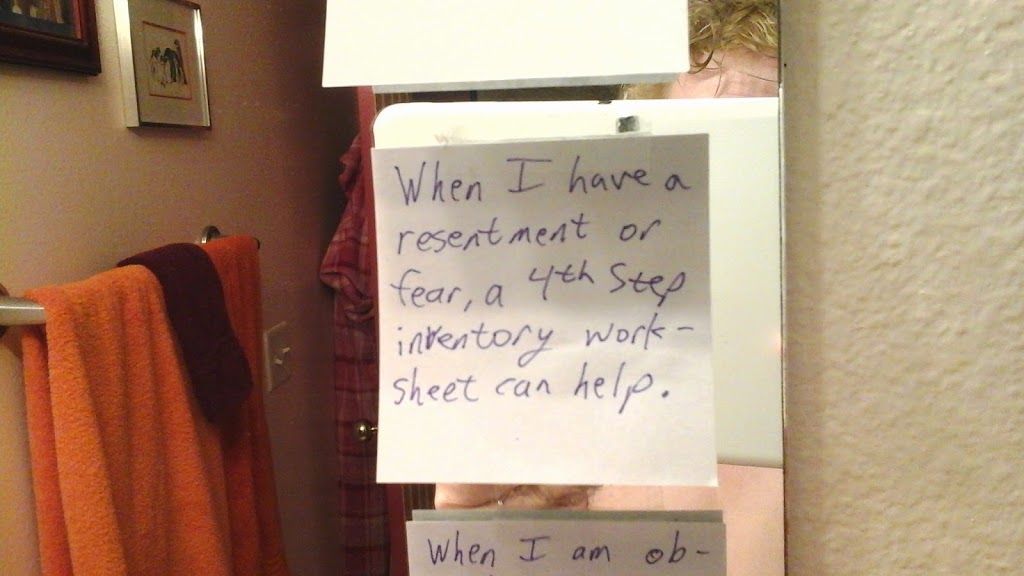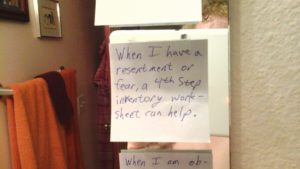
Tag: inventory
Did you know there’s an app for that? 10th Step Spot Check Inventory is an Android app that is meant to help you do exactly what it says on the wrapper.
Helping me today also are this link from Serenity Web and this one from Mr. Sponsorpants and this one from Annie’s Thoughts and Recovery.
When an incident occurs and feelings are hurt, I need to inventory it for my part and make whatever amends are appropriate. I need to also take care of myself. Some of the amends I might owe may be toward me. Here are some questions I am asking myself to help inventory the incident:
- Did I engage in unacceptable behavior?
- Did the other person engage in unacceptable behavior?
- Did I have acceptance?
- Did I maintain detachment?
- Did I maintain my boundaries?
- What was my part that led up to the incident?
- What can I do to make amends for my part?
- Am I expecting the other person to make amends for their part? Is that appropriate?
- Did I presume goodwill? Do I presume goodwill now?
- Have I been trying to make someone else responsible for my feelings?
- Have I been assuming responsibility for someone else’s feelings?
- What can I do right now to take care of myself?
Any Saturday in Al-Anon world could be a workshop Saturday. It all depends on where you are and what your district or area is up to.
Workshops today. Notes of resources to look into:
- Blueprint for Progress
- Alateen’s Fourth Step Inventory Workbook
“Remember to take your Higher Power with you.”
“We don’t want God to get a busy signal when He’s ready to get back to us.”
“Lighten up, babe, and kick it upstairs.”
“We are not here to analyze ourselves but to build our lives.”
“My should-maker got me in trouble.”
“In God’s time, not mine.”
“I can teach my little girl self. I can love her and cherish her. And I can sign my letters to her, ‘Love, God’.”
“My part is often J&C – judgmental and critical. What I was really doing was expecting someone else to fix a problem that I own.”
“How is my favorite little victim today?”
Good activity for the future. Take a large ball of yarn. Have participants stand in a circle. Each person will pinch a place on the loose end of the yarn, say a character defect they are willing to admit to owning, and then roll or toss the ball of yarn to the other side. After everyone has had a turn, each pinching the yarn, a web will have formed. Point out that this web is actually a safety net, because we share so much of ourselves, have so much in common, that this is a safe place.
Meanwhile, I’m still working that 4th step, still in the “my part” column, but I’m past all the resentments and about halfway through the fears. Sex conduct and other harms are fairly short lists compared to my resentments. then I get to go back to the top and finish the last bit, the “where I was” column. That’s where I was selfish or maybe self-seeking, fearful or perhaps dishonest or inconsiderate. Or any combination thereof.
The 4th step is so good for marking patterns. For instance, nearly every character defect I’m finding has at its root my lack of acceptance. Here I was so proud of myself for being such a rational, practical, realistic person! But I was beating up on myself, refusing to accept my human propensity for error. I was beating up on others for not living up to my expectations. I haven’t been accepting of human beings as human, at least not until recently.
And most of my fears have to do with not trusting my Higher Power.
Terribly interesting. To me, anyway.
My sponsor is taking me through the 4th step really slowly and exhaustively thoroughly. The box with my paperwork must weigh like 14 pounds. We’re doing an AA-style inventory, but it’s almost absurd what’s included. I like it. I’ve been at this for almost a year and a half, and I’m midway down the 4th column.
I’m learning some very interesting things. For instance, nearly all my work-related resentments have to do with lack of detachment, lack of boundaries, or both. I tend to take ownership of the behaviors of other people, and thus deeply resent the uncool things they do as some reflection on me. I don’t set a protected area for myself or make a decision about what to do if unacceptable behavior occurs, so I wind up feeling stuck with it and resenting it.
One really neat thing that dawned on me was the cascading nature of some of my three biggest failings.
1. Lack of acceptance – I tend to have trouble accepting people for who and what they are, forever wanting them to be what I figure they should be. Funny thing is, I never thought I was doing that. But anytime I became angry at someone from failing their potential, that’s exactly what this was. Anytime I expected someone to do or be what I needed, when there was no reason to believe they were naturally inclined to, that’s what I was doing.
2. Lack of detachment – As mentioned before, I was personally invested in the behaviors of others. I also took on resentments that were not mine, being angry at people who had hurt people I cared about, whether that was deep in the past or not, whether I had any objective information about the reported harm or not. I thought of it as being loyal, but it was really just poisoning everything.
3. Lack of boundaries – When faced with a pattern of unacceptable behavior, I didn’t know I could plan ahead healthy things to do to remove myself from a toxic situation. I can decide, “If so-and-so starts to do that, I’ll excuse myself to go to the bathroom,” for instance. I used to let people run roughshod over me, or I’d build walls to shut them out. One of the daily readers has a passage that describes a boundary as not a wall, but a bridge, to help facilitate linking ourselves with others. Sounds weird at first, but I get it. I can connect with you, and still have room to lovingly withdraw if I need to. That’s cool.
I can’t get boundaries if I can’t detach my emotions from someone else’s behavior, and I can’t get decent detachment if I can’t accept them as they are. So, like the first step says, it starts with acceptance.
It hurts to see someone in pain. I very frequently see a fellow Al-Anon in such incredible pain from their resentments, and I’ve been struggling with whether to say anything or not, because the nugget of the pain is blaming the alcoholic for their choices.
I’ve been blessed with a sponsor who made sure I started off with a thorough understanding of the disease of alcoholism and what it does to the alcoholic, well and before anything it does to the friends and families of the alcoholic. All of it is terrible and horrible, but it’s important not to miss the most basic element, the physical and spiritual disease. Having this saves me from judgment and resentment that were misplaced before. It saves my peace and helps me heal my relationships.
It hurts to see someone in pain, getting by without that.
So I spoke with my sponsor about whether to say something or not. I don’t want to give advice, because that’s not what we do. We share our experience, strength, and hope. My sponsor said that saying, “It looks like …” is not giving advice. And speaking of what works for me is not giving advice. I knew already that whatever I say, I have to let go the results. Whether the other person uses what I share or not, it’s their decision, their life, their stuff. So I can share, but I have to let go the results.
Being mindful of this, I did share, in exactly that form. I shared that it looked like the person might not have accepted alcoholism as a disease, and that having a sponsor start me there was incredibly valuable to my serenity, to alleviating the pain.
Then I reminded myself to let go.
I’m still reminding myself to let go. The person did not welcome my sharing and told me that I was taking their inventory, when I should instead be taking my own. I wonder if this is the case. I’m not always sure that everyone who talks of taking someone else’s inventory is talking about the same thing. I do know that “let there be no gossip or criticism” is there for a reason, and I take that pretty seriously.
Have I criticized? Have I taken someone else’s inventory? I don’t think so, but I could be wrong. Deep inside, saying nothing at all feels wrong. Criticizing feels wrong as well. I could try to think my way around the issue, but my best thinking got me where I was before the program. I’m an Al-Anon! I’m here to help whether you like it or not! *grin*
I’m reminding myself to let go. Whether my words will ever be of use to the person to whom I gave them, that’s their business. I have put my words above so that they can be whatever use they’ll be to whoever encounters them. Or not. So now I can let go.
Let go already. 🙂
